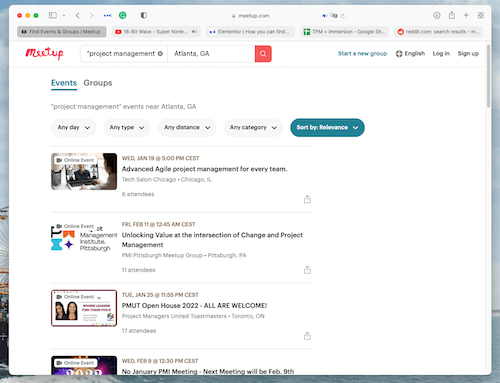You have witnessed the growth of your company from its beginnings to a thriving business. And, what’s great: you are not going to run out of business any time soon.
Until now, you and your team of motivated individuals have been at the heart of this venture, handling all tasks collectively.
But you’ve reached a point where the distribution of tasks must change. Too much coordination and administrative work — organizing the team, scheduling, arranging meetings, managing client relationships, keeping an eye on the budget, reviewing timesheets—remains on the shoulders of you and your best people.
Sure, these are critical activities, but taking care of them yourself prevents you from focusing on the core business.
That’s why you decided to look for a project manager. Someone who can take over the coordination and ensure that your team and your clients deliver on their commitments. Someone who can keep the pace high and create structure while maintaining the same quality of work your team stands for.
But what should you consider when hiring a project manager? What personal qualities should you look for in a candidate? And what does such a job description look like?
That’s what we’ll discuss in this article. I will approach the topic of hiring a project manager from a broader perspective. I think it’s helpful for you to understand the unique aspects of the role, and to recognize the types of people who excel in project management positions. This way, you’ll avoid hiring people who are not suitable for this demanding role. Also, by playing to their motivations and goals, you can more easily attract good people in this competitive job market we are in now.
Here’s what we are going to cover:
- What is a project manager?
- Skills and qualities to look for
- Creating a job description
- Interviewing candidates
- My tips for a hiring project manager
What is a project manager?
Project managers manage complex initiatives that often involve many contributors and stakeholders.
They handle project planning and ensure that all key aspects — especially time constraints, staff availability, budget, and project risks — are considered.
During a project, project managers mainly act as “drivers”. They make sure that tasks are completed on time and meet expectations. This requires regular communication with the team. This way, project leaders can find out about any issues early and intervene to prevent bigger problems.
Additionally, a project leader must regularly consult with the client and other stakeholders to keep them informed about progress and align expectations. This requires tact in dealing with leaders and diplomatic skills.
To manage the multitude of tasks effectively, a project manager must build suitable organizational systems. These include solutions for task management and communication, forms for information collection, document templates, regular meetings, and similar tools.
What qualities should you be looking for?
It’s not always easy to describe personal qualities in a single word. Therefore, I like to explain how desirable traits can be identified in candidates’ demeanor and in their stories about their career paths.
Above all, look for these characteristics to identify a strong project manager:
Strong leadership skills: Promising candidates have proven that they can independently and skillfully manage difficult and time-sensitive tasks by effectively involving other employees. We’re mainly interested in challenging work projects, but what someone does in their spare time can also tell us a lot about their leadership qualities. Suppose someone manages a soccer team in their spare time. For me, that’s a clear sign of leadership qualities, even if their regular job does not involve leadership.
Being a strong leader means several things:
- Enjoying being at the forefront
- Being assertive
- The ability to inspire people
- Having an original personality
Excellent communication skills: Communication skills are key. Anyone aiming to be a project manager needs to be great at communication, because communication is what keeps a project together. These skills are built on talent, courage, and experience. That’s why I value people who’ve worked with a wide range of people before. It shows they know how to handle different people.
For instance, if a candidate mentions they waited tables during college, it’s a good sign they’ve really sharpened their communication skills—and also learned how to deal with tough customers, which is a bonus for a project manager.
Resilience: Anyone who quickly folds under pressure or gets easily discouraged by others is not suited to be a project manager. The job constantly presents new challenges, and project leaders often experience an emotional rollercoaster. Therefore, look for people who have demonstrated a high level of stress resilience in the past. Such individuals usually have an optimistic nature. They believe that with the right amount of effort, any problem can be solved.
Highly organized: Great project managers hate chaos and thrive on structure and processes. They’d rather stay late to organize their emails or clean up their desk than face a mess the next day. These people cleverly use relevant tools or craft Excel templates to capture important project data. They come well-prepared to meetings, take detailed notes, avoid spending time on irrelevant questions, and are fully present in the moment — because they are prepared. During an interview, you can quickly tell if someone falls into the more organized or less organized category.
Dedicated to learning: Project management as a field hasn’t changed much over the years. The same few techniques have been working well for decades, and will probably work well in the future. What’s constantly changing is the environment project managers operate in: IT, banking, science, engineering, you name it. A project manager who doesn’t keep learning and updating their domain knowledge will soon become a burden to the team. They won’t make a good impression in discussions and will struggle to lead the team in the right direction. Look for smart individuals who keep a healthy dose of humility, and live by the principle that there is always room to get better.
Knowledge of project management techniques: Here, we expect not just theoretical knowledge of project management techniques, but in-depth practical experience with tools from the project manager’s toolkit.
At a minimum, candidates should have experience in the following areas:
- Project planning (especially resource planning and coordination)
- Task management
- Meeting facilitation
- Gathering customer requirements
- Stakeholder engagement
- Progress reporting
Anyone who has some initial experience with these tasks can be trusted with a project, even if it is larger and more complex than any they have previously managed.
I myself started with smaller projects and gradually took on larger ones. At first, it’s overwhelming, but over time you find your footing because large projects are managed in much the same way as small ones.
Read also: What makes a great project manager?
Creating a job description
While you can easily define the role of an accountant, it’s more difficult with a project leader position. There’s no uniform definition of what a project leader needs to do. The tasks and responsibilities vary depending on the industry and the size of the company.
This means we need to describe the tasks and expectations for the project manager as clearly as possible. Only if candidates get a clear picture of the position and it meets their goals will they apply.
Now let’s move on to the points that a job advertisement should include:
- About your company
- Field of work (nature of the projects)
- Key responsibilities and expectations; mention the major stakeholders the project manager will be dealing with
- Specifics about the projects
- Necessary skills
- Necessary qualifications
- Company benefits (development opportunities etc.)
To help you get started, I’ve put together a sample job description:
Sample Job Description a Project Manager role
Job Title: Project Manager
Location: [City, State or Remote]
Who is ENERINC?
ENERINC is a prominent independent financial advisory boutique dedicated to facilitating the energy transition. We specialize in mergers and acquisitions (M&A) and project finance services, providing expert guidance and innovative solutions to propel projects that contribute to a sustainable and efficient energy future.
What does the role involve?
We are seeking a skilled Project Manager to lead and oversee various projects within our M&A and project finance sectors. The ideal candidate will manage project development from initiation to closure, ensuring efficient execution that aligns with our strategic objectives and client expectations. This role requires a deep understanding of financial structuring, risk management, and the energy sector, coupled with exceptional leadership and communication skills.
What does the role involve?
- Develop and implement detailed project plans to monitor and track progress while delivering projects on time, within scope, and within budget.
- Coordinate internal resources and third parties/vendors for the flawless execution of projects.
- Manage relationships with clients, stakeholders, and external partners.
- Ensure resource availability and allocation, manage comprehensive project documentation.
- Perform risk management to minimize project risks, establish and maintain relationships with third parties/vendors.
- Create and maintain comprehensive project documentation.
- Measure project performance using appropriate tools and techniques.
What you need is:
- Master’s Degree in Business, Finance, Engineering, or a related field.
- Proven working experience in project management, especially within financial services or the energy sector.
- Solid financial background, with understanding or hands-on experience in financial structuring and project finance.
- Excellent client-facing and internal communication skills
- Strong leadership, decision-making, and organizational skills.
- Excellent analytical and problem-solving abilities.
- Ability to manage multiple projects simultaneously and under pressure.
- Strong attention to detail and a commitment to delivering high-quality work.
- Willingness to travel up to 30%
Why should you apply?
At ENERINC, you will be part of a dynamic team that is at the forefront of the energy transition. We offer a collaborative environment where innovation and knowledge exchange are valued. Join us in our mission to shape a sustainable future through strategic financial advisory services.
This job description includes all the key points about the position. Sure, we could make it even better. But it’s good enough to attract people who want to prove themselves as project managers in this industry.
Keep in mind that candidates for project management positions care a lot about independence and ownership of their work. If a job description makes it seem they have little say in how to manage their projects, they’ll probably avoid the job.
This job description includes all the key points about the position. Sure, we could make it even better. But it’s good enough to attract people who want to prove themselves as project managers in this industry.
Keep in mind that candidates for project management positions care a lot about independence and ownership of their work. If a job description makes it seem they have little say in how to manage their projects, they’ll probably avoid the job.
Interviewing candidates
You’ve narrowed down your list of candidates and now you want to meet them in person. What questions should you ask in the interview to see if they’re a good fit for a project manager role in your company?
As a basic rule for good interview questions: The best way to gauge a candidate’s performance is by looking at how they’ve handled specific situations in the past. So, avoid hypothetical questions (“What would you do if…”), because candidates can just give textbook answers.
Here are some sample questions that test the relevant skills we talked about earlier:
Interview question: Can you share a time when you identified an improvement opportunity at your company? How did you address it?
With this question, we want to find out if the candidate has initiative. Whether they can identify problems on their own and address them with appropriate actions. From their answer, we can also see if the candidate thinks outside the box and ventures beyond the safe zone of their familiar field. These are all desirable qualities for a project leader, because managing projects successfully requires a lot of initiative.
Interview question: Did you ever have to deal with a team member who was not willing to cooperate? What actions did you take?
Here we look at the candidate’s skill in leading people. Handling disagreements and involving difficult or unmotivated employees is part of a project manager’s daily work. Like the previous question, we want to hear about a specific situation. How did the candidate deal with the employee? Did they act like a ruthless dictator, or more like a good coach who listens, asks questions, and guides people in the right direction?
Interview question: If you had just 30 minutes per day to steer a project, what would you spend that time on? Give me specific actions!
No rambling, please! We want to hear specific actions on how the candidate keeps their project on track despite a heavy workload. The answer can reveal a lot about the candidate’s coordination skills and leadership experience. The narrow focus of the question and the request for specific steps quickly show whether the candidate understands their craft as a project manager and if they can prioritize effectively. Also, the question is perfect for testing the candidate’s methodological knowledge, specifically which task management and status monitoring techniques they are familiar with. It’s worth probing further. A good project manager has put together their own “toolbox” of management techniques and knows exactly when each method is most effective.
These are just a few sample questions suitable for selecting project managers. In the interview, you should at least assess candidates’ leadership, communication, and coordination experience. However, it’s also worth looking at other important qualities, such as attention to detail, motivation, and conflict resolution skills.
My Project Manager Selection Guide includes over 40 unique interview questions to help you evaluate project manager candidates using interviews. The questions are based on my extensive experience as a project manager. I’ve designed them specifically to provide a comprehensive view of the relevant skills needed for the role. To help you in evaluating candidates’ responses, I’ve included a detailed answer guide for each question. This will make it easy for you to understand what makes a good or weak answer.
Should you filter applicants through written tests beforehand? Some companies do this, where applicants have to create Gantt charts at home on their computers or write responses to customer emails. I’m not a fan of it. For one, it’s too easy to cheat. Secondly, this practice is more likely to turn away the top candidates. Remember what I said earlier, top performers like to be courted.
Related: Project Manager Selection Guide
Further tips for hiring a project manager
1. Consider actively searching for outstanding people
I wouldn’t rely just on placing a job ad and waiting for people to apply. You’ll receive lots of applications, and some of the candidates may fulfill all the requirements. But few of them will have the personality needed for a project manager role.
What other sourcing strategies should you consider?
Here’s the thing: People working in project management or who want to become project managers are obsessed with personal development. Not only do they “eat” leadership literature for breakfast. As I know from my own experience, these people frequently hang out at networking events, looking to connect with people who are already where they want to be. And it’s exactly at these events where you can meet them.
A great place to meet individuals with a knack for leadership is at local meetups.
Meetup Groups
Meetup.com is an online platform where people organize in-person meetups around topics they are passionate about. There are meetups in virtually every city, covering a wide range of subjects from science, art, and technology to business and management. There are also dedicated meetups for project management. I used to host one in my town for many years!

Anyone who regularly attends such meetups, willing to sacrifice a cozy evening with Netflix to talk about a particular topic is truly passionate about it. These are often people driven by more than just a desire for career. In many cases, they are people who want to make a difference.
Search for meetup groups in your area related to your industry or around leadership. Join an upcoming event! This is a natural way to connect with great talent in your industry. Companies like IBM frequently send their staff to meetups to give presentations. Another great way to draw attention to your company and position it as a thought leader.
I know of several cases where meetups led to successful hires. Being able to engage 1:1 with highly motivated individuals from your industry and learn about their goals makes this a very interesting sourcing strategy!
Using LinkedIn Search
LinkedIn is also great for targeted employee searches, provided you have a clear candidate profile. I should say: candidate profiles, because especially for project management roles, it may make sense to consider different groups of candidates: current project leaders, people in related jobs with some leadership experience, and finally, candidates who are currently transitioning from a specialist position to a project manager role.
Upgrade to a LinkedIn premium account, and you can conveniently search using multiple criteria and find interesting candidates in your region.
Find top performers via your network
Top performers like to be around other top performers. We can use that to our advantage. Make a list of the top performers you know. They may work in different areas, but that doesn’t matter. They may know people working in the same or similar industry as yourself. Craft a personal message to pass on to your friends along with the job description. Don’t just forward the job description. Top performers want to feel courted, for example, by being contacted directly by the CEO.
3. Hire top performers who are unhappy in their current role
I keep getting messages from super-motivated people in IT and other areas who are yearning for more responsibility. They have already proven themselves by successfully managing smaller projects and are now eager to sink their teeth into larger challenges. Unfortunately, they find no room for growth in their current companies, either because of the company’s small size or the absence of bigger projects down the road.
As a senior project leader, I’ve always enjoyed working with these kinds of people, and I would recommend most of them without hesitation for positions with a lot of responsibility.
So, if a highly motivated candidate expresses their interest and perhaps doesn’t meet all the technical criteria, consider whether they could be your new project manager.
Willingness to perform and personal drive can outweigh technical skills and credentials. Plus, you can hire a motivated newcomer in project management for much less than a project leader with many years of professional experience.
One more thing
When it comes to hiring, we often focus heavily on skills. Sure, we need to get specific work done. However, we too often overlook the personality of candidates and how it meshes with our workplace culture. But we often forget to think about the kind of person they are and if they’d fit in with our team. See, project managers really shape the vibe in a company because they work with so many people. Strong leaders who exude positive energy can uplift the entire team, but the opposite can also happen. So, when selecting your future project manager, consider whether they fit into your company culture. And if the company culture isn’t clearly defined yet, ask yourself what kind of company you’d like to work for 5 or 10 years from now.
Author
-
Hi, I’m Adrian, a Senior Project Manager and the Creator of Tactical Project Manager, where I teach a pragmatic approach to project management. Led large-scale IT and business projects for over 10 years. My goal is to enable you to lead any project with confidence.
View all posts



